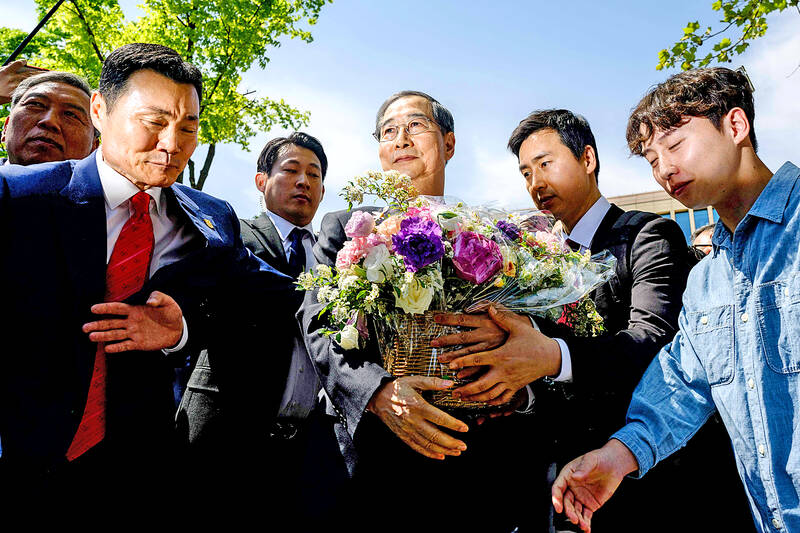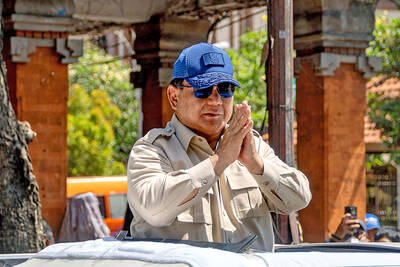Former South Korean prime minister Han Duck-soo yesterday said he is to run in next month’s presidential election, and would seek to lessen the powers of the office and ease strife-ridden domestic politics if he wins.
Han’s entry heats up the scramble among conservatives to unify behind a candidate to compete with liberal front-runner Lee Jae-myung, whose campaign was set back by a court decision to open a new trial on election law contravention charges.
“I have determined to find what I can do for the future of the Republic of Korea that I love and for all of us. I will try my utmost to be chosen by the people at this presidential election,” Han told a press conference at the National Assembly.

Photo: AFP
South Korea is holding an early presidential election on June 3, after former South Korean president Yoon Suk-yeol was ousted over his imposition of martial law. Han was appointed prime minister, the No. 2 post, by Yoon, and he served as acting leader after Yoon was suspended and later removed from office. He also was prime minister under former president Roh Moo-hyun from 2007 to 2008 and has served as minister of trade, industry and energy, minister of economy and finance, and ambassador to the US during his 40-year career in public service.
He has never held elected office, but has risen politically, as the People Power Party (PPP) struggled in the wake of Yoon’s ouster.
Han does not belong to a political party, but contenders in the PPP have said they are willing to field a single candidate among them and Han. PPP members are scheduled to nominate their party’s candidate today.
Han said that if elected, he would launch a body to amend the constitution so the president and the assembly share powers based on the principle of checks and balances. His revisions would also bar the political circle and the judiciary branch from meddling in each other’s sectors.
In South Korea, executive power is heavily concentrated on a president, and there have been calls for change.
The new president would have full, single five-year term, but Han said he would serve three years to finish the constitutional revision and then leave.
Han said he would also use his expertise on economic affairs to resolve trade issues with Washington over US President Donald Trump’s tariff policies.
Lee’s main liberal opposition Democratic Party stepped up its offensive against Han, saying he is abandoning his duties as the government’s caretaker and lacks the moral standing to run for the presidency as a No. 2 official in the Yoon administration, responsible for many policy failures.
“We warn to former Prime Minister Han. Do not hide your greed with a lie that you are running for the people,” party spokesperson Noh Jong-myun said.

DEADLOCK: Putin has vowed to continue fighting unless Ukraine cedes more land, while talks have been paused with no immediate results expected, the Kremlin said Russia on Friday said that peace talks with Kyiv were on “pause” as Ukrainian President Volodymyr Zelenskiy warned that Russian President Vladimir Putin still wanted to capture the whole of Ukraine. Meanwhile, US President Donald Trump said that he was running out of patience with Putin, and the NATO alliance said it would bolster its eastern front after Russian drones were shot down in Polish airspace this week. The latest blow to faltering diplomacy came as Russia’s army staged major military drills with its key ally Belarus. Despite Trump forcing the warring sides to hold direct talks and hosting Putin in Alaska, there

North Korea has executed people for watching or distributing foreign television shows, including popular South Korean dramas, as part of an intensifying crackdown on personal freedoms, a UN human rights report said on Friday. Surveillance has grown more pervasive since 2014 with the help of new technologies, while punishments have become harsher — including the introduction of the death penalty for offences such as sharing foreign TV dramas, the report said. The curbs make North Korea the most restrictive country in the world, said the 14-page UN report, which was based on interviews with more than 300 witnesses and victims who had

COMFORT WOMEN CLASH: Japan has strongly rejected South Korean court rulings ordering the government to provide reparations to Korean victims of sexual slavery The Japanese government yesterday defended its stance on wartime sexual slavery and described South Korean court rulings ordering Japanese compensation as violations of international law, after UN investigators criticized Tokyo for failing to ensure truth-finding and reparations for the victims. In its own response to UN human rights rapporteurs, South Korea called on Japan to “squarely face up to our painful history” and cited how Tokyo’s refusal to comply with court orders have denied the victims payment. The statements underscored how the two Asian US allies still hold key differences on the issue, even as they pause their on-and-off disputes over historical

CONSOLIDATION: The Indonesian president has used the moment to replace figures from former president Jokowi’s tenure with loyal allies In removing Indonesia’s finance minister and U-turning on protester demands, the leader of Southeast Asia’s biggest economy is scrambling to restore public trust while seizing a chance to install loyalists after deadly riots last month, experts say. Demonstrations that were sparked by low wages, unemployment and anger over lawmakers’ lavish perks grew after footage spread of a paramilitary police vehicle running over a delivery motorcycle driver. The ensuing riots, which rights groups say left at least 10 dead and hundreds detained, were the biggest of Indonesian President Prabowo Subianto’s term, and the ex-general is now calling on the public to restore their